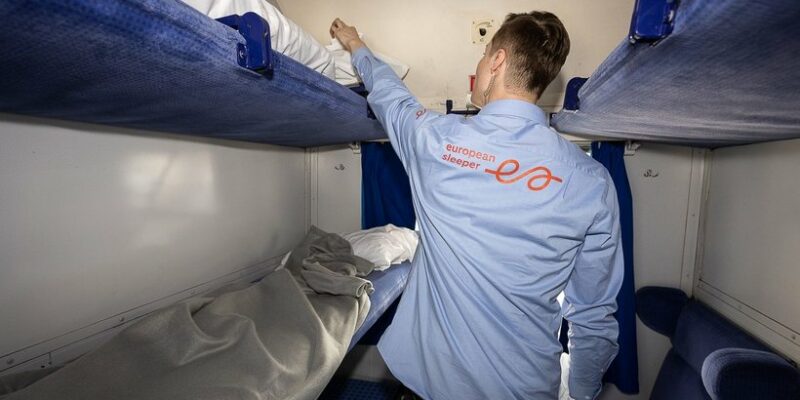Passengers dreaming of bidding farewell to flying now have a new nostalgic alternative for traveling across Europe, as reported by global media. Three nights a week, travelers can board the European Sleeper train in Brussels, which departs at 19:22 and arrives in the heart of Berlin the next morning at 8:30. The service emphasizes affordability, so luxury should not be expected.
Night trains are making a comeback in Europe. There is a new night line available from Brussels to Berlin, which also offers the option of a bed. This allows passengers to sit on the train during the night for three nights a week and arrive refreshed for breakfast at their desired destination. The service is already operational and competes with the Austrian night train service ÖBB. The European Sleeper also stops in Rotterdam, Amsterdam, and The Hague. As reported by Skynews, this is certainly one of the simplest green solutions: “Fall asleep in one European capital, and the next morning, enjoy a fragrant croissant and coffee in another.”
The carbon emissions per passenger mile on a train are approximately one-fifth of those caused by air travel. This is one of the driving forces behind Chris Engelsman, the founder of The European Sleeper company. “This is a sustainable and enjoyable way of traveling, and we truly believe it will also be profitable,” he told SkyNews. He sees the advantage of night trains in allowing passengers to cover longer distances more comfortably in an eco-friendly manner: “All the way to Barcelona, Milan, Prague… And it’s still time-efficient.” As he believes, it is already a competition to air travel today. However, he admits that they don’t need to convince all current air passengers. Only five percent of them should switch from flight tickets to train tickets, which would mean full occupancy of their trains, he describes.
A fleet that evokes nostalgia: affordability, not luxury
The provider uses a recycled and renovated fleet, which evokes a touch of nostalgia for some passengers. A Skynews journalist, who tested a sleeping carriage, described the experience as a strange mix of luxury and spartan simplicity: “Night trains inevitably evoke images of retro-glamour, especially if you’ve watched too many James Bond movies or read too many Agatha Christie novels.”
As he illustrated, the berths are comfortable, the sheets are clean, and there is a sink hidden in the corner cupboard, equipped with mirrors. The fleet is decades old, and unfortunately, for those hoping for exciting encounters in the dining car, it does not include a dining wagon. For a bed in a shared compartment, you will pay 81 euros, and for a private room, twice as much. The company is also striving for new carriages, but Engelsman points out that they are committed to affordability, not luxury offerings: “We have decided not to go for luxury because we want this to be a mode of transportation for ordinary people, accessible to all. In the future, we also want to add a dining car to our offerings.”
From Brussels, they want to create a hub for night trains. One already exists to Vienna, this one to Berlin, and in the future, they also want to connect Southern Europe, he says. As planned, the European Sleeper will also travel to Barcelona.
In 2018, one percent of the world’s population caused 50 percent of all aviation emissions. Meanwhile, 80 percent of people in the world have never flown and bear the burden of the climate crisis, struggling with more frequent and dangerous heatwaves, floods, and droughts caused by the harmful consequences of private planes and aviation emissions, Greenpeace Slovenia reports.
European Sleeper tickets are accessible to all passengers of railway carriers who use the SEPA reservation system.
(Summarized from https://www.caszazemljo.si/trajnostno/zaspite-v-eni-evropski-prestolnici-zjutraj-pa-ze-uzivate-v-kavi-in-rogljicku-v-drugi.html)
Photo: Profimedia
